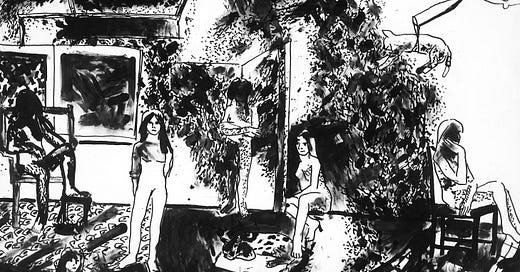“I don’t think there’s such a thing as ‘meant to be,’ because it all depends on the context,” says Honor Moore. “For example, you could say I was meant to be a housewife with five children, but I went against that. Or you could say I was meant to be an artist, and despite the struggle, I became one.”
This week at Public Seminar, our authors consider the power of female refusal.
In an interview with Elide Vincenti, Moore discusses how having an abortion in 1969 changed the trajectory of her life. Hannah McIntyre reviews an exposé of Brandy Melville, a fast-fashion brand that only fits a very particular teenage body type. And Luis Jaramillo chats with Marisol Aveline Delarosa about misunderstood female magic in his new novel, The Witches of El Paso.
Her Choice
Honor Moore and Elide Vincenti
Honor Moore: One of my lovers, who could have been the father of the pregnancy, actively obstructed my writing. It wasn’t until after I made the decision to have the abortion, which was truly a decision for my own independence, that I began to understand the idea of independence, what we now might call an autonomous life. That transformation for me happened within the context of the women’s movement. I joined a consciousness raising group in 1970. We learned to support each other; we had a real aim, that women no longer be driven by rivalry for men, that we become sisters in struggle.
Read an excerpt from A Termination, courtesy of Honor Moore and A Public Space Books.
The Fashion for Baiting, Brainwashing, and Bullying
Hannah McIntyre
Brandy Melville is a multinational fast fashion company that was first based in Italy. In the United States, it gained significant traction once it introduced a “California girl” style and flooded the social media of America’s “it girls.” The brand is known for producing trendy clothes that are affordable, but here’s the kicker: they have a “one size fits all” business model.
Generations of Women in The Witches of El Paso
Marisol Aveline Delarosa and Luis Jaramillo
Luis Jaramillo: One thing that I found out, just looking at census records, was that during World War II, my grandmother and her sisters were living with their mother but they were also living with somebody who was listed as a boarder, who I knew as the guy who married my great-grandmother. But then my aunt told me that my great-grandmother somehow gave her dead husband's identity to someone else so that they could live in the United States legally. I don't know how that happened exactly, but there's a lot of stuff like that—that I didn't actually know, but I could sense that there were a lot of these things that people were ashamed of, that they hid. So it turned into a story of triumph or a funny story or a story of survival.
Read an excerpt from The Witches of El Paso, courtesy of Luis Jaramillo, Primero Sueño Press, and Atria Books.




